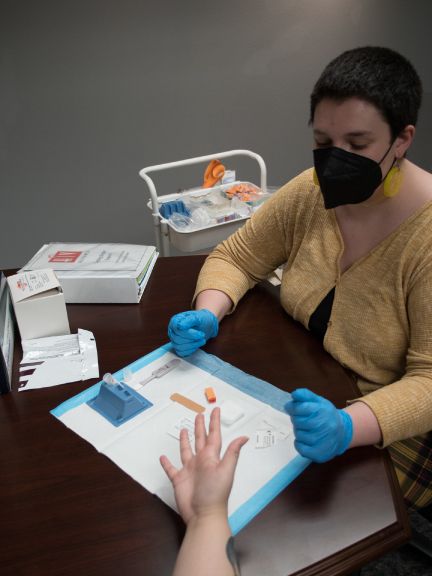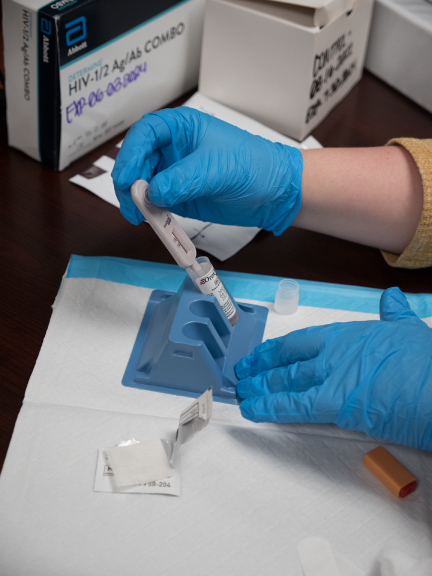
Accessing Hepatitis C Treatment
HIV Alliance Offers Treatment for Hepatitis C Through our Eugene Medical Clinic
People living with hepatitis C may receive treatment at HIV Alliance’s Alliance for Community Wellness. We invite you to learn more about the medical clinic and how to schedule an appointment with a provider to seek hepatitis C treatment.
Client Education Resources
HCV 101
Hepatitis C (HCV) is a virus that is transmitted primarily by blood. The word hepatitis literally means “inflammation of the liver.” Hepatitis can be caused by viruses (such as hepatitis A, hepatitis B, and hepatitis C), or by drugs, medicine, alcohol, toxins, autoimmune disease, and bacteria. The liver itself performs over 500 bodily functions and when damaged can impact the functioning and health of other organs in the body.
Facts About HCV:
- HCV Is a blood-borne virus, transmitted blood-to-blood, that damages the liver
- The liver is a vital organ with over 500 functions – we cannot live without a liver.
- The most common way that HCV is transmitted is through sharing injection drug equipment like syringes; it can also be transmitted through contaminated instruments used in tattooing or piercing, or through sharing personal care items like razors, tweezers, clippers and toothbrushes.
- HCV can be sexually transmitted but the risk is considered to be low.
- HCV can live up to 3-6 weeks on a surface like a table1, and can live up to 63 days inside a syringe.
- Approximately 20% of people who have hepatitis C have the acute type which presents with symptoms like a severe flu but resolves itself within 6 months; the remaining 80% have chronic hepatitis C which generally has no symptoms and people can have it for 20-30 years without knowing it.
- Approximately 3-5% of HCV infected mothers pass on the virus to their babies.
- Hepatitis A, B and C are completely separate viruses and are only found in humans. There are vaccines for hepatitis A and B.
- There is no vaccine for hepatitis C.
- There are new drugs like Sovaldi and Olysio that can cure hepatitis C – consult your doctor for more information.
Complications of long-term liver disease include:
- Impotence
- Fatigue
- Pressure in the spleen & intestines
- Weakened blood vessels in the esophagus & stomach
- Fluid accumulation in the abdomen
- Fluid build-up in the feet & ankles
- Toxin-related impaired cognitive function

Getting to Know HCV

- HCV was officially identified in 1989.
- There are 6 different genotypes of HCV
- The most common and severe symptom of HCV is fatigue.
- There is no correlation between a person’s health and the concentration (viral load) of the HCV the person has (in terms of the health of the liver).
- Sexual transmission is low-risk for transmitting HCV because it is transmitted from blood to blood.
- There is some controversy about the risk associated with sexual transmission of HCV because many people who believe they acquired the disease through sexual activity also had other risk factors for acquiring HCV, such as intravenous drug use.
- It is estimated that the risk of an HCV positive mother passing the virus on to her baby at birth is about 3-5%. These numbers are only estimates, however, because many studies of HCV do not include people in prisons or the homeless.
- When a person first contracts HCV they need to limit their fat intake. When the disease is more progressed they need to limit protein intake because the liver develops problems with processing protein.
- HCV puts a person at increased risk for acquiring liver cancer.
- About one quarter of HIV-infected persons in the United States are also infected with HCV. Those that contracted HIV through injection drug use have a co-infection rate between 50-90%.
- HCV is one of the most important causes of chronic liver disease in the United States and liver damage resulting from HCV infection progresses more rapidly in HIV-infected persons. HCV infection may also impact the course and management of HIV infection.
- HCV lives longer outside the body than HIV, and is infectious for at least 16 hours and up to 4 days. If you are protecting yourself against HCV, you are also protecting yourself against HIV.
Board Members & Staff
Meet the dedicated individuals who lead and support HIV Alliance in our mission to empower communities and transform lives. Learn more about our board members and staff who bring expertise, passion, and commitment to our work every day.
Work at HIV Alliance
Join us in our mission to support people living with HIV/AIDS and prevent new HIV infections. Explore career opportunities and learn how you can serve your community, while advancing your career.
Annual Reports & Financials
Access our annual reports and financial statements to learn more about our organizational performance, impact, and stewardship of resources.

Hepatitis C Case Management and Prevention is supported by the Prevent Cancer Foundation.
